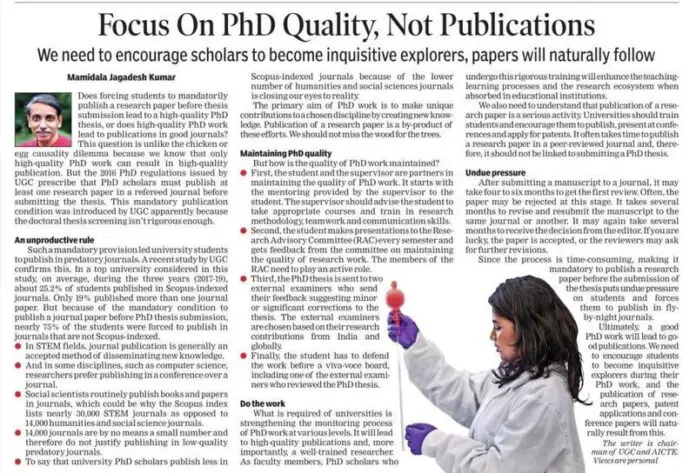In today’s academic environment, the emphasis on PhD students publishing research papers before completing their thesis has sparked debate. Does mandatory publishing lead to high-quality PhD work, or does a quality thesis naturally result in publications in prestigious journals?
Focus on PhD Quality vs. Mandatory Publications: A Critical Analysis
This is similar to the chicken-and-egg problem. We know that high-quality PhD work can lead to significant publications, but should that mean students must be required to publish a paper? Since 2016, the University Grants Commission (UGC) has made it mandatory for PhD students to publish at least one research paper in a refereed journal before submitting their thesis. While this rule intends to enhance the academic rigor of PhDs, it might not address the actual quality of doctoral work.
Also Read: What is Most Important in a PhD? The Quality or Quantity of the Journal Publication?
The Problem with Mandatory Publishing
According to the Mr. MAMIDALA JAGADESH KUMAR, Chairman, University Grants Commission. This regulation was introduced to ensure that PhD students contribute actively to academic research. However, recent data suggests that many PhD students in India submit their papers to low-quality journals, particularly predatory ones, to meet the UGC’s requirements. A study of ten Indian universities revealed that around 25.2% of students publish their research in non-reputable journals like Scopus-indexed platforms.
This practice undermines the purpose of quality PhD work. Instead of focusing on conducting innovative research, many scholars are compelled to rush through paper publication processes to comply with UGC regulations. This situation reduces the impact of their research and raises concerns about the authenticity of their contributions.
Shifting Focus: Knowledge Over Numbers
While the UGC’s goal is to uphold academic excellence, forcing PhD students to publish prematurely may result in mediocre research output. Academic research should not be reduced to a mere counting of publications. Instead, it should aim to contribute unique knowledge and advance the field.
Publishing a research paper should be a by-product of rigorous academic work. True PhD quality emerges when students are encouraged to become inquisitive explorers, making original contributions to their discipline. Once the focus shifts from mandatory publications to maintaining academic rigor, research papers will naturally follow.
How to Maintain PhD Quality
Maintaining PhD quality requires a partnership between the student and their supervisor. A few key factors in this partnership include:
- Mentoring and Skill Development: Supervisors must guide students through a well-structured mentoring process. This involves advising students to take relevant courses, helping them develop necessary research skills, and improving their teamwork and communication abilities.
- Regular Presentations: Students should make regular presentations to the Research Advisory Committee (RAC) to receive feedback on their work. This practice ensures that their research maintains its relevance and quality.
- Practical Training: In addition to research skills, PhD students should also undergo rigorous training in teaching methodologies. This will enable them to contribute more effectively to the education system and develop teaching-learning skills.
The key to PhD success lies not in simply meeting publication requirements but in fostering an ecosystem of intellectual curiosity and rigorous academic standards. A solid foundation in methodological training will ensure that PhD scholars can produce impactful, well-researched work that naturally leads to publications in reputable journals.
Why an Overemphasis on Publications Hurts Research
The pressure to publish often encourages students to aim for quantity over quality, leading to rushed, underdeveloped work. If students focus solely on submitting papers to meet academic requirements, they miss the opportunity to critically engage with their research topics, which is the core of the PhD journey.
PhD research is meant to cultivate an individual’s ability to ask complex questions, explore unfamiliar concepts, and contribute innovative ideas to their field. By emphasizing publications, we risk turning PhD programs into a numbers game where creativity and intellectual rigor are sidelined.
The Path Forward: Encouraging Explorative Research
Academic institutions must nurture intellectual curiosity in their PhD students to produce truly impactful research. This can be achieved by allowing scholars to focus on their thesis work, guiding them through exploratory research that will naturally lead to high-quality publications.
Rather than pushing for publications, institutions should ensure that PhD students develop critical thinking, gain mastery over research methodologies, and make original contributions to their field. In doing so, we will foster a generation of scholars capable of advancing knowledge meaningfully.
Conclusion
The goal of a PhD is not merely to publish a certain number of papers but to contribute unique, high-quality research. While publications are an important metric of scholarly work, they should come as a natural result of in-depth, well-guided research. By shifting the focus from mandatory publications to quality work, institutions will be better positioned to foster academic excellence and innovation in their PhD programs.
Credits: Mr. MAMIDALA JAGADESH KUMAR, Chairman, University Grants Commission. Times of India
FAQ Section
1. Why is there a debate on PhD publications?
The debate centers on whether mandatory publications improve the quality of PhD research or lead students to publish lower-quality work to meet academic requirements.
2. What is the main issue with mandatory publication rules?
The main issue is that students may submit papers to predatory or low-quality journals just to meet the requirements, compromising the quality of research.
3. How can PhD quality be maintained?
PhD quality can be maintained by ensuring strong mentoring relationships, rigorous research skills development, regular presentations for feedback, and appropriate training in teaching methodologies.
4. What is the role of a PhD supervisor?
A supervisor plays a key role in guiding students through their research, ensuring they develop the necessary skills and contribute meaningfully to their field.

